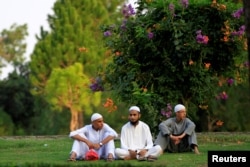Counterterrorism authorities in Pakistan are planning to introduce a new policy to curb extremism in the country. But analysts say only a thorough and effective implementation of the strategy would help the country rid itself of the carnage.
Pakistan's National Counter Terrorism Authority (NACTA), which monitors and proposes counter-extremism strategies, has devised a new policy, called National Counter Extremism Policy (NCEP), to curb extremism and militancy by introducing social and education reforms and facilitating good governance.
“NCEP is a set of programs in the six fields with an objective to build strong bond between state and citizenry, empowerment and inclusion of youth and marginalized elements, reforming educational streams including religious education and instilling an environment of openness and co-existence,” NACTA chief officer, Ihsan Ghani said in a statement.
Religious schools to blame?
Once approved by the federal government, the policy would be shared with the provinces for implementation, a NACTA official told VOA.
The NACTA chief said the new policy would also propose reforms in the education sector, including the widespread Madrassa system and “instilling an environment of openness and co-existence.”
Thousands of unregistered Madrassas, or religious schools, across the country have led to an increase in militancy in the country, experts say.
Attracting youth into ideology
The analysts say militant groups have been successfully attracting educated youths into their ranks.
A recent report in the Pakistan-based newspaper Dawn showed out of 500 militants currently held in Sindh province's jails, 64 hold a master's degree and 70 have a bachelor's.
Analyst say the new policy comes as Pakistan has come under increasing criticism from U.S. officials and some international organizations over its inability to curb homegrown militancy and extremism in the county.
“Pakistan recently has come under tremendous pressure, particularly on the presence of militant groups in Pakistan posing a threat to regional security,” Pakistan-based defense analyst Saad Mohammad Khan, a retired military leader, told VOA. “The BRICS statement has created widespread concerns in Pakistan.”
Last week, leaders of BRICS, an economic bloc comprising Brazil, Russia, India, China and South Africa, expressed concerns over Pakistan-based militant groups and cited them as a problem for regional security.
Announcing his Afghan policy, U.S. President Donald Trump last month said Pakistan must stop harboring militant groups that use Pakistani soil to plan and launch attacks against Afghan and NATO forces in Afghanistan.
Experts say Pakistan's previous counter-extremism strategies have been less successful in curbing extremism in the country.
“Pakistan came out with a National Action Plan soon after the Peshawar school attack that seemed very impressive on paper. But today, several years later, the progress has been limited,” said Michael Kugelman, a South Asia analyst at the Windrow Wilson Center in Washington.
Effective implementation
Analysts believe that the success of the new counter-extremism policy hinges on an effective implementation of the strategy.
“We have heard about many impressive initiatives from Pakistan in recent years that aim to expunge extremism on societal levels. This is all well and good, but the question lies in implementation and enforcement,” Kugelman said. “Will authorities indeed carry out these plans, and will progress be monitored?”
“The state makes policies but they do not get implemented and that's the real challenge,” Khan said. “Do we have the courage, commitment and vision to implement the policies we make?”





